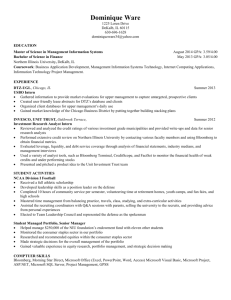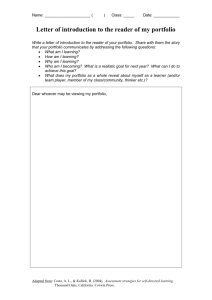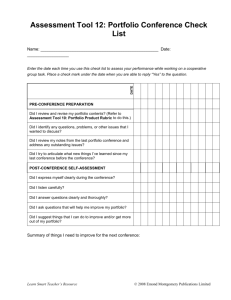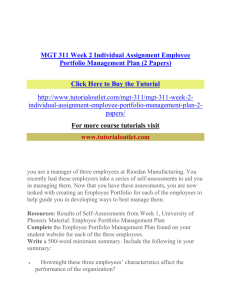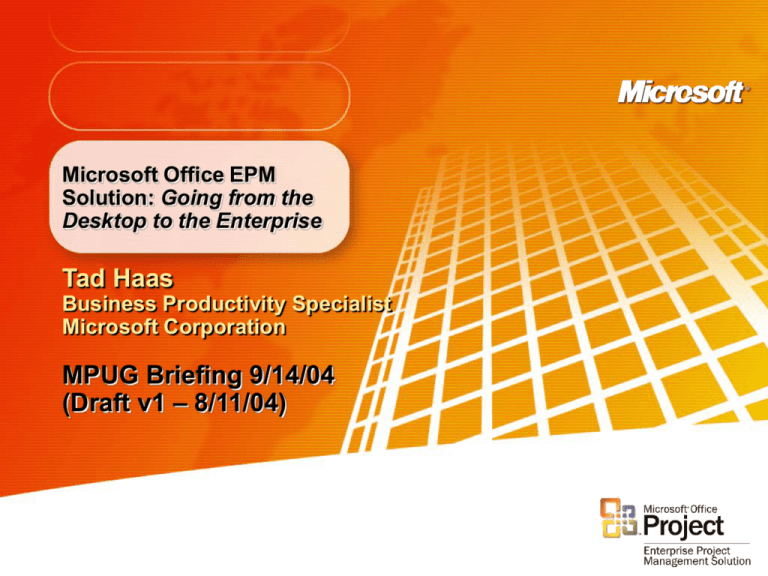
Microsoft Office EPM
Solution: Going from the
Desktop to the Enterprise
Tad Haas
Business Productivity Specialist
Microsoft Corporation
MPUG Briefing 9/14/04
(Draft v1 – 8/11/04)
Project Management
Evolution – Desktop to
Enterprise
Individual
managers
Scheduling
and reporting
Greater team
participation
Collaboration
on docs, risks
Project portfolio
management
People utilization
and tracking
Participation Across Your
Organization is Key
Executive Stakeholders
Resource Managers
Project portfolio management,
reporting
Skills-based resource
management
Team Members
Use familiar tools to collaborate,
report status
IT Managers
Open, secure
systems
Project Managers
IT
Managers
Intuitive project management
Project
Managers
Team
Executive
Members
Stakeholders
Resource
Managers
•
•
Can
we
link
project
data
with
front
&itback
office?
When
will
really
finish
and
what
will
cost?
What
What’s
am
the
I we
supposed
status
our
to be
top
delivering
3our
initiatives?
this
week?
Who’s
available
toofstaff
our
new
projects?
What’s
the
best&
way
towith
deploy
and
monitor?
Can
we
re-use
best
practices
across
projects?
How
can
I see
collaborate
prioritize
initiatives
people
on
across
my team?
my
org?
Who's
working
on
what
and
do
they
have
the
skills?
Connecting Your Employees To Projects
Using Familiar Tools
Executives
Resource Managers
Team Members
Line of
Business
Systems
Project Managers
Powerful Capabilities for
Your Organization
Visibility
Insight
Control
Portfolio
Management
Scorecard Reporting
Portfolio Analysis
Risk Mitigation
Templates
Portfolio Modeling
Resource
Management
Resource Allocation
Capacity Planning
Project
Management
Cost System Integration
Communication &
Collaboration
Variance Reports
Web Access
Status Reports
Skill Matching
Resource Substitution
Staffing
Methodology Integration
Project Templates
Outlook Integration
Document Management
Scheduling
Issue Tracking
Email Notifications
Microsoft Office Enterprise Project
Management Solution
Inconsistent project delivery
affecting quality of work
Multiple project failures
negatively impacting
profitability
Repeatedly missed
deadlines and budget
overruns
Inaccurate project reporting
hindering performance
tracking
Inability to monitor and
communicate potential
project issues
Deliver sustainable value to your business
Project Management Addresses
These Challenges
Consistent quality of delivery
Implement and refine
repeatable processes for
high-quality project delivery
Improved profitability
Maximize operational
performance through reduced
cycle times
Sustained business vitality
Stay ahead of the competition
and exceed customer
expectations
Greater governance and
control
Identify cost and schedule
variances to identify at risk
projects earlier
Your Projects Cannot Afford to Fail
Succeed
34%
Fail
15%
Over time
or over
budget
51%
66% of all IT projects
fail, come in over
budget or run past the
original deadline
Every year, $55 billion
is wasted on failed IT
projects in the U.S.
Business Impacts:
Chaos Chronicles 2003, The Standish Group
Reduced profitability
Inability to fund new
projects
Poor customer
satisfaction
Why Projects Fail
1.
Inadequately trained and/or inexperienced project
managers
2. Failure to set and manage expectations
3. Poor leadership at any and all levels
4. Failure to adequately identify, document and track
requirements
5. Poor plans and planning processes
6. Poor effort estimation
7. Cultural and ethical misalignment
8. Misalignment between the project team and the
business or other organization it serves
9. Inadequate or misused methods
10. Inadequate communication, including progress
tracking and reporting
gantthead.com, “The Top 10 Reasons Projects Fail”, Frank Winters, 2003
Project Management Can Help
Companies implementing EPMOs successfully
see an approximately 80% return on
investment (ROI), a 20% reduction in project
cycle time, a 30-35% increase in successful
project delivery and such intangible benefits
as improved employee morale, productivity
and empowerment.
Giga Information Group, “Designing an Enterprise Project Management Office to Improve Organizational Project Management Efficiency”, August 09, 2002
Growing Adoption of Project
Management
Giga Research, a wholly owned subsidiary
to Forrester Research Inc., expects to see
an annual 15% per year increase in formal
project management practices during the
next five years.
Giga Information Group, “Project Management Best Practices: Key Processes and Common Sense”, Margo Visitacion, January 30, 2003
Powerful Project Management
Capabilities
Defined processes
and guidance to
manage projects in a
consistent manner
Robust scheduling
capabilities to keep
project teams on track
in meeting customer
expectations
Issue tracking and
reporting to improve
decision making and
performance
Deliver High-Quality Projects
Consistently with Repeatable
Processes
Incorporate and adopt
standard project
management
methodologies
Easily roll-out
customized processes
and best practices
Guide new project
managers through all
phases of project
management
Meet Customer Expectations with
Accurate Planning and Tracking
Create realistic project
plans based work required,
resources available and
budget constraints
Enable team members to
help keep project plans up
to date
Easily identify variations in
actual performance from
intended project goals
Proactively address
problem areas and
resource conflicts to keep
projects on track
Improve Accountability and
Resolution of Issues
Centrally store, assign
and escalate projectrelated issues
Recognize problem
areas early and
resolve issues quickly
before they jeopardize
the success of
projects
Increase team
members’ ownership
and accountability of
this process
Microsoft Office Enterprise Project
Management Solution
Lattice Semiconductor
Designs, develops and markets high-performance programmable
logic devices and related software
World’s leading supplier of in-system programmable logic devices
Solution
Streamline product development process to provide executives an
enterprise wide view of all development projects
Value to the Business
Improved competitive advantage
Developed a common method for scheduling and tracking projects
Enhanced visibility into project and resource status
Increased resource effectiveness and productivity
Simplified management of projects
Microsoft Office Enterprise Project
Management Solution
Cooper Tire & Rubber
Founded in 1914, specializes in the manufacturing and marketing of
rubber products
23,000 employees and 52 manufacturing facilities in 13 countries
Solution
Shrinking product life cycles and market share lead Cooper to streamline
business processes from marketing concept development and project
mold creation to prototype procurement and design certification
Value to the Business
Increase market share and profitability by reducing time-to-market by
50%
Net revenues are projected to grow U.S.$1.6M over three years
Lower TCO to total $2.9M over three years
Microsoft Office Enterprise Project
Management Solution
NASA
The Spaceport Engineering and Technology Directorate, an
organization within NASA, integrates engineering and spaceport
technology development for Kennedy Space Center in Florida
Solution
Management and reporting of project schedules, human resources, and
budgets to help plan, manage and track projects
Value to the Business
25% savings in project tracking time
Easier monitoring of project status, budget, and schedules
Unified and shared reporting across projects
Coordination of available personnel and skills to project or task
requirements
Improved team communication
Microsoft Office Enterprise Project
Management Solution
Microsoft Project Business Unit
Formed in 1988 to develop project management software, the
Microsoft Project Business Unit has grown to about 100 employees
Solution
Developers needed to plan and track processes for building nextgeneration software
Benefits
Product developers align plans with group business strategies to
measure progress against strategic objectives
Collaboration increasing worker efficiency by simplifying processes
Collaboration reduced management overhead by 50% in development
stage
Project Failure is Controllable and
Avoidable
Top 10 Reasons Projects Fail
Avoid Failure with the EPM Solution
Inadequately trained and/or
inexperienced PMs
2. Failure to set and manage
expectations
3. Poor leadership
4. Failure to adequately identify,
document and track requirements
5. Poor plans and planning processes
6. Poor effort estimation
7. Cultural and ethical misalignment
8. Misalignment between the project
team and the business
9. Inadequate or misused methods
10.Inadequate communication,
including progress tracking and
reporting
1.
1.
gantthead.com, “The Top 10 Reasons Projects Fail”, Frank Winters, 2003
2.
3.
4.
5.
6.
7.
8.
9.
10.
Project Guide, Microsoft Partner
training courses and books
Issue and Risk management
Risk management, Portfolio
management, Microsoft Partner
training courses
Document management
Integrated cost/scheduling,
Baselines, Resource management
Activity-level work estimates
integrated with schedule
Collaboration and communication
functionality
Portfolio management
Project Guide and Templates
Project Web Access, Outlook
integration, email notifications
Meeting Your Project Goals with
the Microsoft Office EPM Solution
Reduce operational costs
Increase profitability
Gain business agility
Develop a flexible capability
Sustain competitive advantage
Enterprise Resource Management
Limited visibility into how employees
are being deployed
Underutilized resources across the
organization
Misalignment of resource assignments
and business strategy
Difficult to identify resources with the
appropriate skill set and availability to
work on projects
Disconnect between desired
skills/core competencies and
recruiting and training efforts
Difficult to forecast future resource
needs for proper capacity planning
Deliver sustainable value to your business
Resource Management Addresses
These Challenges
Reduce operating expenses
Better utilize staff; do more
with less
Effectively manage your
labor pool
Gain a holistic view of the
composition of your workforce
Align resources with
business goals
Ensure recruiting and
training investments
effectively
Manage labor market volatility
Forecast skill requirements;
Retain top employees and
strengthen core competencies
Ramifications of Poor Resource
Management
Continued reliance on inexperienced
project managers and the use of ad hoc
methods and processes may
inadvertently harm corporate relations
with employees - or, worse, with trading
partners and customers - since projects
may meet cost/schedule performance
goals only through heroic efforts.
META Group, July 9, 2003, “Lack of Project Management Skills Is a Major IT Issue for Many Organizations”, META News Analysis
Resource Management Can Help
BENEFITS
Firms measure the benefits of these (services
automation) solutions primarily in terms of improved
resource utilization (typically 5-15%), reduction in IT
administrative costs, and reduced project time-tocompletion (8-12% improvement is common).
PAYBACK
Implementation payback is often achieved in 1 to 2
years, with some projects paying for themselves in as
little as 6 months.
META Group, January 9, 2003, “IT People and Process Improvement: Core Functions”, Ronald Hanscome. Meta Delta File: ADS 1240.
What Is Resource Management?
Availability
Location
Skills
Aligns people with
business goals by
allocating resources to
your highest priority
initiatives
Optimizes resource
utilization and drives
skill development and
recruitment to achieve
greater financial
returns and ensure
project success
Growing Adoption of Resource
Management
By 2006, more than 50% of IS
organizations will have adopted a mix of
project portfolio management application
services for managing team collaboration,
allocating resources, and tracking utilization
and costs (0.7 probability).
- Gartner
Gartner, Inc., July 2003, “Magic Quadrant for Project Portfolio Management”, Matt Light
Powerful Resource Management
Capabilities
Centrally store and
standardize resource
information
Manage resource
utilization for optimal
allocation and
forecasting
Build high-performing
teams that leverage
and maximize talents
Centralize Resources for Ongoing
Skills Management
Centrally store,
standardize and
manage resource
information across the
organization
Consolidate resource
requirements to
identify and avoid
shortages in advance
Evaluate labor pool to
ensure employee skills
align with your
business strategy
Assemble High-Performing Teams for
Increased Project Success
Analyze and assign
resources to projects
based on skill,
availability, and
location
Filter and query the
resource pool based
on defined criteria
Model the effects of
substituting resources
before implementing
changes
Understand Workload Trends for
Effective Capacity Planning
Evaluate resource
utilization trends to
determine staffing
strategy
Forecast future
resource requirements
based on historical
utilization
Ensure capacity to
handle current and
planned staffing
requirements
Microsoft Office Enterprise Project
Management Solution
AXA Financial
50 million individuals and businesses look to AXA to insure their
property, protect their family or employees, manage their personal
or business assets
130,000 employees and sales associates world wide
Solution
Centralized time recording processes, including defining capitalization
per project, tracking overtime and nonstandard hours, and reporting
costs at a project level
Value to the Business
Standardized reporting for resource and time management
Simplified view of a single or multiple business units and projects
Improved resource allocation and management
Microsoft Office Enterprise Project
Management Solution
Starwood Hotels
Global group operating the Sheraton, Four Points, Westin,
St. Regis, Luxury collection, and W Hotels
114,000 employees worldwide
Solution
Starwood Hotels and Resorts EAME needed real-time project
management intelligence to optimize use of available human and capital
resources on multiple, multi-national IT projects
Value to the Business
Ability to manage complex projects more efficiently
Maximizes the use of human and capital resources
Increased productivity and reduced costs
Meeting Your Resource Goals with
the Microsoft Office EPM Solution
Align resource utilization and
development with business strategy
Maintain high productivity and staff
morale
Balance resource capacity and demand
Predict future skills and training
requirements
Enterprise Portfolio Management
Gain visibility, insight, and
control of all aspects of your
project portfolio
Ensure initiatives align with
your strategic objectives
Bring your organizational
“parts” together and get a
clear “big picture” view
Realize participation from all
project stakeholders
Deliver sustainable value to your business
Your Business Faces Increasing
Complexity
Misalignment of projects and business
strategy
Lacking a consolidated view of your
organization’s activities and their status
Inability to compare and measure projects
consistently to understand the state of your
portfolio
Taking on projects that are too risky and fail
too often
Missing out on higher-reward opportunities
Portfolio Management Addresses
These Challenges
Support Business Strategy
Align projects and resources
with corporate objectives
Return on Project Investment
Make timely, informed
decisions based on accurate
information
Risk Tolerance
Prioritize and select projects
based on investment goals
Business Agility
Act and react swiftly in
changing markets
Organizations Lack Agility and
Defined Management Practices
84% of companies are unable to adjust and
align their budgets with business needs
more than once or twice a year
84% of companies either do not do business
cases for any of their IT projects or do them
only on select/key projects
89% of companies are flying blind, with
virtually no metrics in place except for
finance
MetaGroup, “The Business of IT Portfolio Management: Balancing Risk, Innovation and ROI”, Jan 2003
Portfolio Management Can Help
Leaders in IT portfolio management
demonstrate ways to cut IT costs by 2% to 5%,
improve productivity 25% to 50%, and shift 10% to
15% of the IT budget into more strategic projects.
Eric Austvold, The AMR Research Report, What it Takes to Be a Leader in IT Portfolio Management, July 21, 2003.
Estimates link project portfolio management
efforts to about a 30% return on investment
over the first full year.
InformationWeek, “Tracking the best-laid plans: Companies managing multiple projects as
diligently as their investments and finding it pays,” Norbert Turek, May 2003
What is Portfolio Management?
Strategy
Setting &
Portfolio Monitoring
Process Definition
& Improvement
Information
Flow
Project Execution &
Status Reporting
The ongoing process
of identifying,
prioritizing, and
investing in projects
that align with your
corporate strategy
Continual flow of
information provides
insight into project
performance and
supports strategic
decision making
Growing Adoption of Portfolio
Management
By 2006, more than 50% of IS
organizations will have adopted a mix of
project portfolio management application
services for managing team collaboration,
allocating resources, and tracking utilization
and costs (0.7 probability).
- Gartner
Gartner, Inc., “Magic Quadrant for Project Portfolio Management”, Matt Light, July 2003
Powerful Portfolio Management
Capabilities
Roll-up reports to
effectively monitor
and evaluate your
portfolio
Powerful analysis to
make timely and
informed business
decisions
Modeling to
understand the impact
of portfolio changes
Monitor Performance through Roll-Up
Reports
Gain a consolidated
view of your business
Increase visibility with
key performance
indicators
Establish consistent
metrics and
thresholds for
evaluating project
performance and
portfolio health
Make Better Business Decisions with
Portfolio Analysis
Review comprehensive,
real-time portfolio
information to ensure
effective decision
making
Compare current
portfolio progress
against forecasted
performance
Identify trends over
time to understand and
improve your business
Understand Your Options with
Portfolio Modeling
Develop “what-if”
scenarios for
evaluating and
responding to evolving
business needs
Understand the impact
of changes to projects
or resource staffing
before they become
part of your actual
portfolio strategy
Microsoft Office Enterprise Project
Management Solution
Emerson Liebert
Liebert has over one million power and environmental control
systems installed throughout more than 100 countries
Solution
Embrace a project management strategy for developing new products
faster, more cost effectively, and on time
Value to the Business
Global framework for standardized project management
Improved cross-team communication
Visibility of project schedule, resource, portfolio and project
information across the organization
Meeting Your Portfolio Goals with
the Microsoft Office EPM Solution
Align projects with business strategy
Improve ROI across your portfolio
Optimize investments
Conduct powerful analysis and
modeling on real-time information
Gain insightful business intelligence
Enterprise Collaboration &
Communication
Geographically and
organizationally dispersed
workforce
Low participation throughout
project management process
Mounting volume of data to filter
through
Difficult to access complete, upto-date project-related
information
Limited ability to share
information and knowledge easily
Deliver sustainable value to your business
Effective Collaboration Addresses
These Challenges Head-on
Encourage Innovation
Support virtual and viral teaming
Maintain Accountability
Maximize participation across all
project stakeholders
Streamline information flow;
Maximize Operational Efficiency Centralize project documentation
to reduce rework and duplication
Improve Project Performance
Promote an open and ongoing
exchange of knowledge and
lessons learned
Poor Communication Leads To
Failure
Ineffective communication ranks among the Top
10 biggest barriers to effectiveness according to
the latest “State of the CIO” survey conducted by
CIO Magazine.
AVOIDING FAILURE
CIO’s rank the ability to communicate effectively
as the most pivotal skill for success (78%).
CIO Magazine, “The State of the CIO”, April 1, 2003, Lorraine Cosgrove Ware.
Good Communication Improves ROI
Improved planning, resource
utilization, project change
management and project
communications will provide most
enterprises with significant return on
investment (ROI).
- Gartner
Gartner, Inc., February 5, 2003, “Project Portfolio Management: Get a Grip (Again)”, Matt Light.
What is Collaboration &
Communication?
Collaboration:
centralized access to
project information and
resources that streamlines
knowledge sharing across
the organization
Communication:
ability to continuously and
quickly interact with
participants to
successfully execute
projects
Executives
Project
Managers
Customers
Knowledge
Hub
Team
Members
Resource
Managers
Partners
Growing Reliance on
Communication & Collaboration
Gartner, Inc., “Workforce Management: Your Best Investment Is in People”, December 5, 2002, Diane Morello and Cathy Harris.
Powerful Communication &
Collaboration Capabilities
Make information
easily accessible and
relevant through the
web and familiar tools
Boost productivity
through automated
processes that make it
easy to stay connected
Enable all team
members to participate
for improved project
performance
Quickly Access Relevant Information
through the Web
Easy access to
personalized, up-todate project
information
Effectively manage
and prioritize work
activities
Submit progress on
tasks and deliverables
to keep plans up to
date and on track
Ensure Participation and Productivity
with Familiar Tools
Manage and report
progress on tasks
through e-mail and
Outlook calendar
Stay informed about new
tasks, upcoming
deadlines, changes to
documents with alerts
and automated e-mails
Easily transfer and
present project data in
PPT, Word, Visio and
Excel
Improve Quality, Ownership and
Accountability
Reduce rework and
duplication of efforts by
centralizing and controlling
project deliverables
Strengthen team
collaboration and
innovation by sharing
information and lessons
learned
Proactively identify,
manage and respond to
risks and issues
Microsoft Office Enterprise Project
Management Solution
Sutter Health
One of the nation’s leading not-for-profit networks of communitybased hospitals and physician organizations with 36,000 employees
serving more than 100 Northern California communities
Solution
Facility planning and development required Enterprise Project
Management to administer a 10-year and $3.5 billion capital program
Value to the Business
Centralization of information
Improved financial understanding of projects
Improved utilization of limited resources
Easily accessible history of projects for more predictable estimates
Microsoft Office Enterprise Project
Management Solution
NASA
The Spaceport Engineering and Technology Directorate, an
organization within NASA, integrates engineering and spaceport
technology development for Kennedy Space Center in Florida
Solution
Management and reporting of project schedules, human resources, and
budgets to help plan, manage and track projects
Value to the Business
25% savings in project tracking time
Easier monitoring of project status, budget, and schedules
Unified and shared reporting across projects
Coordination of available personnel and skills to project or task
requirements
Improved team communication
Meeting Your Communication Goals
with the Microsoft Office EPM Solution
Enhanced team productivity
Improved operational efficiency
Increased participation of all project
stakeholders
Improved project performance
© 2003 Microsoft Corporation. All rights reserved.
This presentation is for informational purposes only. MICROSOFT MAKES NO WARRANTIES, EXPRESS OR IMPLIED, IN THIS SUMMARY.




